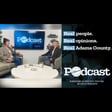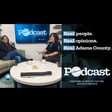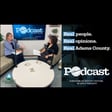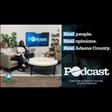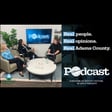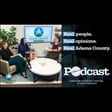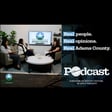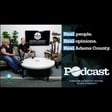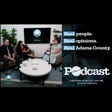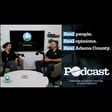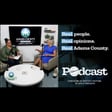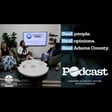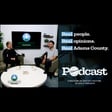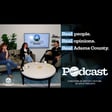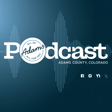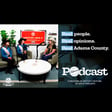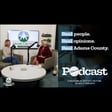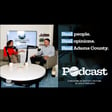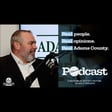Become a Creator today!Start creating today - Share your story with the world!
Start for free
00:00:00
00:00:01

All in Adams--Ovarian Cancer Awareness Month
September is Ovarian Cancer Awareness Month. In this episode of All in Adams, we sit down with with ovarian cancer survivor Commissioner Lynn Baca and Thomassen Davis from the Adams County Health Department to shine a light on the importance of awareness, support, early detection and more. We’ll also dive into the changing landscape of cancer prevention and how services offered here at Adams County are helping people take charge of their health.
Transcript
Introduction to 'All In Adams'
00:00:04
Speaker
Welcome to All In Adams, the official podcast of Adams County Government, where we're all in for our residents, our employees, and our community. So whether you live here, work here, or you just want to know more about what makes Adams County a great place to be, thanks for tuning in.
00:00:21
Speaker
We're all in, Adams.
Meet the Guests: Commissioner Lynn Baca and Thomason Davis
00:00:23
Speaker
All right, welcome back to the All In Adams podcast. I am your host, Nikki Wellander, and I'm the press secretary here at Adams County.
Discussion on Ovarian Cancer Awareness
00:00:31
Speaker
Today, I'm joined by Commissioner Lynn Baca, the chair of our board of county commissioners and an ovarian cancer survivor.
00:00:38
Speaker
I'm also joined by Thomasin Davis, sexual health and harm reduction clinical advisor with the Adams County Health Department, is also a nurse who works every single day to connect residents with preventive care.
00:00:49
Speaker
We'll talk about Commissioner Baca's journey, why awareness matters so much, and about some of the related services offered by Adams County Health Department. Thank you both so much for being here today to talk about this important topic.
00:01:01
Speaker
Thank you for having me. Yes, thanks for having us. Absolutely.
Commissioner Baca's Cancer Diagnosis Journey
00:01:04
Speaker
Commissioner Baca, let's start with you. Can you tell us the story of your battle with ovarian cancer? Absolutely. So my battle started 22 um It was not the battle I thought I was going to fight.
00:01:18
Speaker
I was being seen for an abnormal pap smear, so I was being seen for something else. um had been treated for that and then for cervical. just routine, routine treatment. And it kept coming back abnormal. And so I had a best friend, an ally, an advocate in my corner. So my best friend said, you know, you've been at this for a while. You should go out and get a second opinion, which I did.
00:01:44
Speaker
And by the time I went and saw my second, of the second opinion doctor, um, my cycle had stopped completely. And the doctor, my regular doctor, the second opinion doctor shared with me that it was just my lifestyle of burning the candle at both ends, going to school full time, working full time.
00:02:03
Speaker
My diet wasn't great. My sleeping patterns weren't great. And I said, that's fine. i have I'm due for an annual appointment in about two months and I'll just come back to you then. And she says, well, if you think there's something wrong, if this is not normal for you, then let's just go ahead and take the next step.
00:02:18
Speaker
and do an ultrasound. And so we did an ultrasound. They called me back for another ultrasound and I did the the next ultrasound. um They went in and did a biopsy thinking it was the cyst on the ovary and it was supposed to be an outpatient.
00:02:32
Speaker
And I ended up staying one night in the hospital um to recover from that. It went to pathology and they came back and I was diagnosed with ovarian cancer. Wow. And you said this was 22 years ago.
Advocacy and Emotional Journey in Cancer
00:02:45
Speaker
Yes. Tell me about after that diagnosis, how you battled the cancer and how you came to be able to say now that you're a survivor and you beat it.
00:02:54
Speaker
Yeah. So the battle just isn't a physical battle. I think that there's a psychological um component to all of this and um of course emotional, and it all happens at the same time. So I just remember completely being in like a free fall and the psychological part is, is that it's a hurry up and wait. It's go get a test, go get a blood test. And then you wait for the results and go get a scan. And then you wait for the results and Then they you meet with the the team of what your treatment option looks like. And so at that time, my treatment was um full abdominal surgery.
00:03:28
Speaker
So the tumor had broken apart when they tried to take it out in that what should have been an outpatient surgery. um They saw some spots on my liver. So my scar is about hand width right under my breast line. It goes all the way down to my bikini line.
00:03:44
Speaker
So it was a major abdominal surgery followed by, i think it at the time it was three rounds of chemo treatment. It's been several years. since this was diagnosis. um My chemo treatment was Monday through Friday from 8 to 5. I'd be the first one in the infusion center. I'd be the last person out of the infusion center with my family and friends.
00:04:06
Speaker
um I get treatment for a week, and the following Monday i would be off for about two two weeks, and I'd go back in um for the next treatment. So how long were you in treatment for, and when did you officially find out that you were cancer-free?
00:04:21
Speaker
Wow. So I was in treatment from, we couldn't start. I remember this ah specifically is that we couldn't start on Labor Day weekend. So I went in that following Monday and I was in treatment till right before the holidays.
00:04:35
Speaker
um Before the treatment, they give you a blood test to make sure all your numbers are right. And I did have to be sent home one time because my counts were too low. Um, so that stretched it out to just right before the holidays, I want to say about November.
00:04:49
Speaker
um I think I was free in December and then, um, the follow-up. So you have many follow-up appointments and I remember I was about, just under five years as about four years and six months. And I do keep track.
00:05:05
Speaker
Um, and so when my doctor told me that he did not need to see me anymore, i wasn't expecting that. I wanted it to be, the I thought it was really looking at the five year mark. Um,
00:05:17
Speaker
And I just remember the anxiety of finding out early, which should have been a good anxiety. And it was um not a good anxiety because these were folks that were part of my life for five years. They were my security blanket. They were my hope that I would get a test. And they said, don't come back for six more months. You're doing great.
00:05:37
Speaker
And I remember just asking him like, well, can I please come back to you for a while? And he's like, you know, I'll see you again. um i don't get to see many survivors. so you're you're welcome to come back and see us at any time.
Importance of Sharing Personal Cancer Stories
00:05:49
Speaker
So this month, this September, is Ovarian Cancer Awareness Month, and it is ah mark for you of your survival. And you have really started talking a lot more openly about your journey.
00:06:03
Speaker
Why was it important for you to start talking about your story? And what do you hope comes from that openness? Wow. So it was really last year, um starting to meet with people as I campaign, even meet with people casually in social settings.
00:06:19
Speaker
And i think for a single woman my age that people... always ask, like, do you have kids? I think that's an opening um statement to another woman is, do you have kids? And there was this awkward silence of how do I answer this in my head and just the racing thoughts of how do I answer that? And then when I met with um a really good confidant of mine and same thing comes up when you run for a political office and I shared with him my story and my full story, which included being an ovarian cancer survivor,
00:06:54
Speaker
that I never talked about publicly, like my family, my close friends know. And he said, you need to share your story because your story is tied so closely to your service to community. And so it wasn't really until the last year that I started sharing my story.
00:07:10
Speaker
And you you shared with me some of the advocacy that you did with going to the walks. And I think it was really powerful some of what you shared with me. Would you mind telling me the story of of being a part of of those pieces for other people going through this?
00:07:25
Speaker
Yeah, so when I got diagnosed, it was... um Unlike, you know, you hear the C word and people get really emotional. It's the worst thing that happened to them. I'm not saying it's the greatest thing that happened to me, but I really went forward really with a positive note. I always wanted to do advocacy, but then life happens and you don't, you don't go back to advocacy. So my sister at the time was in network news um in Chicago and she had for several years been the MC of the ah ovarian cancer walk in Chicago.
00:07:57
Speaker
And they invited me to come out. And so I co-emceed with her. And that was um very emotional to talk to survivors, to talk to families and allies of um ovarian cancer survivors. And then when I went back the following year, um same thing, same emotion. They have an ovarian cancer quilt. We take a survivor picture.
00:08:21
Speaker
and I remember asking the organizer, i said, you know, the crowd is about the same as it was last year. And how's advocacy going? How's your fundraising? How is this working out for Chicago being such a large metropolitan city? And, um, they shared with me that it's really a challenge because people get diagnosed so late in life.
00:08:44
Speaker
Um, um, that it really is newly diagnosed. It is those that are walking for memories of a loved one, but it's not the survivorship that we typically see.
00:08:57
Speaker
I got diagnosed when Susan G. Komen was really a big up and coming walk um across the nation. And exponentially you would see the the crowd grow year after year and the advocacy and the donors and the sponsors. And so that was part of my advocacy work in Chicago that really grounded me in this is a really important topic to talk about, but then life happens.
00:09:21
Speaker
Of course. And so it has come up just recently within the last 18 months. Absolutely.
Early Detection and Advocacy in Ovarian Cancer
00:09:27
Speaker
And Thomason, hearing Commissioner Baca tell her story, from a public health and a nursing perspective, why is awareness so critical with ovarian cancer, even when there is no routine screening test?
00:09:39
Speaker
I guess the the obvious answer is that everybody with ovaries has a risk of ovarian cancer. And then um how important it is to listen to your body and be aware when something isn't right and have, as Commissioner Baca said, her ally that gave her the confidence to go forward and ask for a second opinion.
00:10:00
Speaker
i think women or people with ovaries really oftentimes don't step forward and ask for a second opinion. And think I hope that by sharing stories like this, um women will get braver and more self-assured to ask for more follow-up.
00:10:21
Speaker
I think the other reason why it's important to bring up ovarian cancer is that it often doesn't get diagnosed until it's already spread into the abdomen and then treatment is much more difficult so it's it's not like a breast lump that you do a lumpectomy it's just like she said full abdominal surgery lots of chemotherapy it's very emotionally and um physically taxing Absolutely.
00:10:49
Speaker
And do you think that having more conversations openly like this in forums like this really gets people talking about topics like early detection, whether it is specifically for ovarian cancer or to talk about that C word, like you said, more openly, even though it's a hard topic to talk about?
00:11:07
Speaker
I do. I think the more we talk about it, the more we share our stories, um the more okay it is to talk about cancer. And cancer is part of everyone's journey.
00:11:19
Speaker
um Most people have a loved one or a family member or a personal journey with cancer. And and I think when Commissioner Bocco was going to get those cervical cancer screenings, that's ultimately what led her to her ovarian cancer diagnosis. so So just talking about those kinds of routine screening tests are important also.
00:11:44
Speaker
Absolutely.
Self-Advocacy and Preventive Healthcare
00:11:45
Speaker
Commissioner Baca, one of the things that we spoke about as well was you talked about the importance of advocating for yourself in the doctor's office setting. Can you tell me a little bit more about what you would say to somebody who might be saying, maybe it is time to get that second opinion, or maybe I just want to go and ask for that first test.
00:12:01
Speaker
What would you say to somebody about advocating for yourself in these medical settings when that might be a little bit scary or difficult for someone? Yeah. So Thomas Thomas and brings up a really good point of Women have a tendency, not to say men don't, of putting others first and solving everyone else's problems and and taking care of yourself last.
00:12:21
Speaker
And those routine screenings is what led to my diagnosis. I think advocacy is really important and use your voice as use your voice as an individual. And then also use your voice for others, because it was really my best friend that said, go get a second opinion.
00:12:38
Speaker
um and using your voice for others is doesn't mean. interviews like this. You don't have to go to a cancer walk to use your voice for others. It is talking to your sisters. It's talking to your nieces, your mom, your mother-in-law, your grandmas, your neighbor, um your best friends of, did you go get checked up? Did you go to your appointment? Make sure you make that appointment. What were the results of that appointment? And having those open conversations um really is the foundation of advocacy work.
00:13:10
Speaker
um I think that Yeah, I just think that that's what's really key is that we all stay connected with one another. um it makes it less scary for people that when you do go through it.
00:13:22
Speaker
Absolutely.
Preventive Services in Adams County
00:13:23
Speaker
And I love what you've brought up multiple times now, that it was a routine prevention screening that found this. And that if you had not been going in for your preventive routine care, this would not have been caught at the point that it was. And, Thomas, and that ties right into the public health work that we do at Adams County Health Department.
00:13:44
Speaker
um I would love to hear more about some of how... making sure that you're getting those routine screenings, even if it's not necessarily for finding ovarian cancer, what is the importance of preventive care when it comes to finding all of these different types of concerns that people can look for?
00:14:06
Speaker
think one of the main... pros of going in for your routine cancer screenings is creating a relationship with a provider. So having a primary care clinic or a provider who you can call when something doesn't feel right is is really important.
00:14:23
Speaker
And then at Adams County in particular, we have a breast cancer screening program, which we're very proud of. We have cervical cancer screening program also.
00:14:34
Speaker
And we do um HPV tests and pap tests and colposcopies, which can find the precancers. and refer for treatment if you have cervical cancer.
00:14:46
Speaker
And then for our breast program, we have we teach breast self-awareness, actually. And then we do clinical breast exams and refer out for mammograms at no cost.
00:14:58
Speaker
Wow, that's a really comprehensive list of things that we offer that can really get people thinking about their preventive care and help refer people to additional care if they need it to help start building that primary care relationship.
00:15:12
Speaker
And one of the other things that you and I have talked about too is the importance of learning your family history, especially when it comes to knowing more about your risk for certain kinds of cancers. Can you tell me a little bit more about that, Thomas? and Yeah.
00:15:25
Speaker
think ovarian cancer is 25% of ovarian cancers are hereditary. And there are some genetic mutations that happen. There's the BRCA gene that is commonly linked to ovarian cancer.
00:15:39
Speaker
And then there's other ones. So there's breast cancer linked to ovarian cancer and colon cancer linked to breast ah ovarian cancer. And also ah there's a pancreatic cancer risk, um which sometimes increases your risk of ovarian cancer.
00:15:55
Speaker
So not everybody would get screened for that, but if you have it in your family history, it kind of guides your primary care clinic and what tests to order. And um when you have these symptoms of bloating or fullness, um they may take it a little more seriously.
00:16:12
Speaker
Absolutely. So having those conversations, like you mentioned, that advocacy with your sisters, with your friends, with the people who know you the closest, having those conversations about your family history can lead to having better conversations with your primary care physician that can help you have a better, more full health picture that can lead to better better outcomes for people is kind of the picture that I'm getting from both of you here.
00:16:38
Speaker
So as we're talking about cancer prevention, what I'm really hearing is that cancer prevention of all kinds is so crucial. Thomasin, can you tell me a little bit about the HPV vaccine that we offer here at ACHD and how that is another kind of cancer prevention?
00:16:52
Speaker
We do have the HPV vaccine in stock and we have... um Many people who take advantage of that when they come to our sexual health clinics and we realize they don't have all their vaccines, we go ahead and get them caught up on their vaccines. It used to be that Gardasil, the HPV vaccine was only, um,
00:17:13
Speaker
ah recommended for children, so age 9 to 11, and now it's expanded up to age 45 for men and women. And it protects from not just cervical cancer, but also throat or head and neck cancers and anal cancers as well.
00:17:31
Speaker
That's amazing. That's amazing. And it is available in the Adams County Health Department Clinic. Yes, it is. Yes. Fantastic. Commissioner Baca, as somebody who has lived through ovarian cancer, how does it feel to know that while ovarian cancer is hard to to to detect and hard to prevent, there are tools to prevent and catch other cancers early?
00:17:53
Speaker
So thank you for that question. um Listening to Thomason, you know, the health department here at Adams County is, we're going on our third year, I believe next January.
00:18:03
Speaker
um This was part of the reason that we decided to break from Tri-County Health is to really hone in on those diseases, those treatments that we can offer directly to our citizens.
00:18:15
Speaker
um There's also a big change within the counties of Arapahoe, Douglas and Adams. And we can we can treat, prevent, have informational sessions with our constituents specifically of what matters to them.
Advancements in Cancer Care and Awareness
00:18:30
Speaker
And so there's a number of offerings of programs through the Adams County Health Department. I'm hearing kind of for the first time of all the different vaccines and preventative, what is the vaccine and how can it prevent other cancers, which is really great.
00:18:44
Speaker
That's really, it's really amazing to hear all of these different updates. And but for both of you, what gives you hope when it comes to the future of cancer prevention and community health here in Adams County for all people, whether they're specifically concerned about ovarian cancer, they're thinking about the entire depth and breadth of things that they should be looking at for their health. And Commissioner Baca, let's start with you. What gives you hope?
00:19:07
Speaker
What gives me hope is that we continue to have these conversations. So we have these conversations, whether it's in a setting like this or it's in a setting with your friends group or your family members um to normalize women's health, reproductive health.
00:19:22
Speaker
um I think that gives me a lot of hope. The other thing is, is really be an advocate for yourself. Like I didn't meet... any of the markers. I was not the demographic that they were, they were probably thinking would get diagnosed with ovarian cancer. And so one of the things is I went to an appointment with my parents and they were talking to my mom and I had to tell them that I really was the patient.
00:19:44
Speaker
So what gives me hope is, um, really the advancement in technology. We have an amazing number of cancer centers in Adams County. um i was treated at the Anschutz Cancer Center. was like one of the only buildings that were out there. And so um the continued advocacy and hope of these walks that happened, see your hospital that partakes in some of these things, that's what's really helpful. And then now we can provide um preventative and informational programming here at Adams County. So that's really wonderful. And that gives me hope every day that we can have these conversations and, and normalize people and women's health.
00:20:21
Speaker
Absolutely. Thomas, and how about you? I think the first cervical and breast cancer um screenings, we've got, you can now walk into most imaging, breast imaging locations and self-refer for screening mammogram. And that was not always the case. You used to have to have a, an order from a physician.
00:20:40
Speaker
And the other thing that's really exciting is that we are looking at self-swabs for HPV testing. So HPV does cause cervical cancer, and we can have women or people with a cervix go ahead and collect their own swab, and they don't have to have that speculum exam.
00:20:56
Speaker
So that's one less barrier for that test. That's really amazing. Hear about the advancements. I think that's one of the things that's really incredible for me to hear is to think about how far all these advancements have come.
00:21:08
Speaker
I think about the HPV vaccine that came out when I was in the age de demographic that it was first recommended for. And to hear now that people of all ages can get HPV vaccination is really just, we're learning more every day. And hopefully we continue to learn more about how to prevent and how to how to make sure that we can detect ovarian cancer earlier and we have more survivors that are able to go to those walks every single year and more people are able to tell their story just like you, Commissioner Baca.
00:21:34
Speaker
So finally, and this one hits pretty close, Commissioner Baca, because you and I had a conversation about this yesterday where I thought to myself I needed to make my own appointment. um If a listener is sitting there thinking, i need to do more for my health,
00:21:48
Speaker
What is one concrete step that they can take this week? And this is for both of y'all. And we'll start with Thomas in this time. um I think the first thing I would recommend is pick up the phone, contact a primary care clinic, check your insurance to see who's on it See if you qualify for Medicaid and work, work to make the first few steps getting established with primary care.
00:22:12
Speaker
How about for you, Commissioner Bacher? love that answer. I think for me is call a friend, call your mom, call your sisters, make sure, check up on them and that they make these phone calls um to have your primary care. That it really starts with um a lot of times a regular routine annual appointment of you know, the sit down and like, are you wearing your seatbelt? And how are you taking care of yourself can lead to other conversations about your overall health.
00:22:41
Speaker
um And then really advocate for yourself and ask questions of the doctor. So I think that those are the biggest things is that we need to be there for one another and really advocate for yourself and make that first phone call and check out your insurance.
Closing Encouragement and Social Media Connection
00:22:56
Speaker
Thank you both so much. This has been such an important conversation and thank you for sharing your stories and your expertise and spending some time with us to talk about something that, like you said, sometimes we don't talk about nearly enough.
00:23:09
Speaker
So ovarian cancer may not yet have a routine screening tool, but there are really powerful steps that we can all take. And one of the most powerful tools in the toolbox is awareness.
00:23:20
Speaker
For Commissioner Lynn Baca and for Thomas and Davis from the Adams County Health Department, I'm Nikki Wellander, and this has been another episode of All in Adams. Thank you so much for tuning in. That's a wrap for this episode of All in Adams. Thank you for joining us as we explore the people, programs, and the policies that make Adams County a great place to live, work, and thrive.
00:23:41
Speaker
If you enjoyed the show, be sure to subscribe and share with your friends, neighbors, and colleagues. Have a topic you'd like us to cover? Let us know. We're all in for bringing you the stories that matter most.
00:23:52
Speaker
Until next time, take care of each other and stay connected with us on Facebook, Instagram, Nextdoor, and X. We're all in, Adams, and we're all in for you.
